Navigation
Install the app
How to install the app on iOS
Follow along with the video below to see how to install our site as a web app on your home screen.
Note: This feature may not be available in some browsers.
More options
Style variation
You are using an out of date browser. It may not display this or other websites correctly.
You should upgrade or use an alternative browser.
You should upgrade or use an alternative browser.
The NEWER Official Discussion Thread for the creation of Israel, the UN and the British Mandate
- Thread starter Coyote
- Start date
- Status
- Not open for further replies.
rylah
Gold Member
- Jun 10, 2015
- 23,386
- 4,950
- 290
Morocco and the cause of Zionism
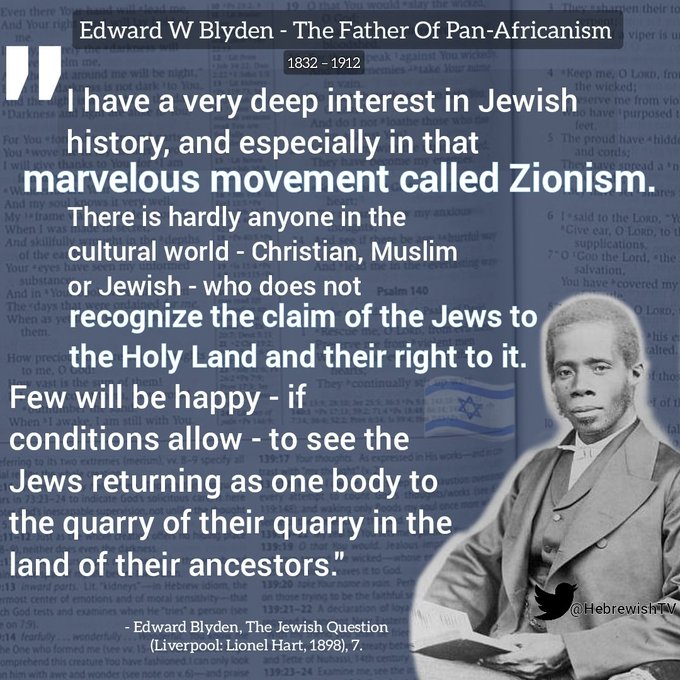
Rabbi Calfon Mosheh HaCohen | North African Zionism
Early Zionist leader and 'Global Village' visionary
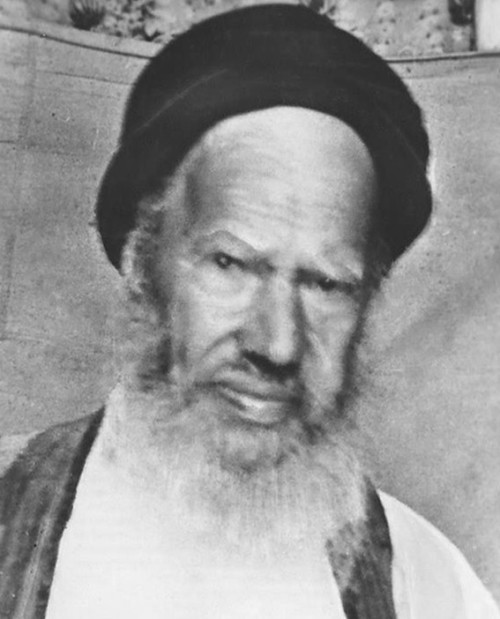
Rabbi Calfon Mosheh HaCohen (1874-1950) was the chief rabbi of Djerba, of the greatest scholars of Tunisia. Wrote numerous books, among them on the topics of Hebrew law, education, morality, sermons, and responsa.
An enthusiastic supporter of Zionism, all his life activity was to return to Eretz Yisrael.
Wrote a cosmopolitan vision, professing world peace and the establishment of an organization similar to the UN in Jerusalem. Passed away in Jerbah on the eve of moving to Israel, and in 2005 his bones were buried in Jerusalem.
The family of Rabbi HaCohen was from the attributed family Cohen Abri"sh, according to tradition descendants of 'Ezra HaSofer. His grand-grandfather Rabbi Shaul HaCohen was the head of court in the small quarter on the island of Djerba. His grandfather from the father's side is Rabbi Moseh HaCohen, the author of the book "Pnei Mosheh", after whom he was named. His father, Rabbi Shalom, authored the books "Nahar Shalom", "Hefetz Yakar", and "Hayyim Shalom", who was the head of court in Jirjis near Djerba.
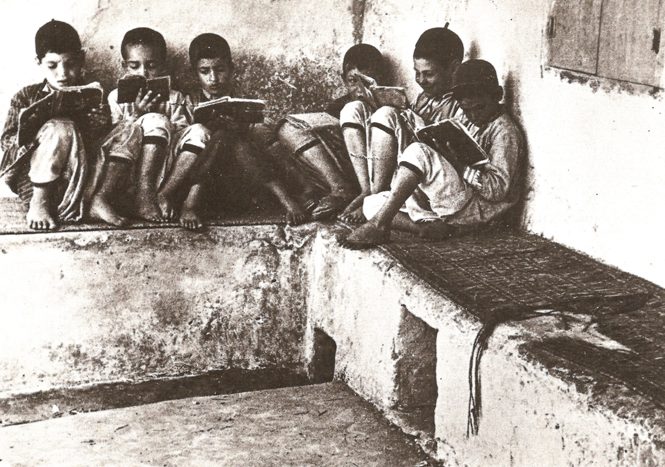
Born in 1874 to Rabbi Shalom Vetraci, on the island of Djerba in south Tunisia. During childhood, his family knew years of prosperity and wealth and was known for generous support for scholars and the poor of Jerbah. During their teenage years, the family's situation worsened and he had to help the housing economy, for which among other things he used to proofread and copy books. Studied with his father and with Rabbi Yosef Barabi, later the Chief Rabbi of Djerba.
When his father was called to lead the community of Jirjis, Rabbi Calfon Mosheh HaCohen was asked to be the Shohet. At 17, learned Shhitah from Rabbi Binyamin Hadad, and served as a Shohet and examiner. Following the hard working conditions, during the summer days under the sun, became ill with fever and his vision was injured. Despite that, initially didn't want to stop his work to support the house, but after many entreaties returned to Djerba to continue his study.
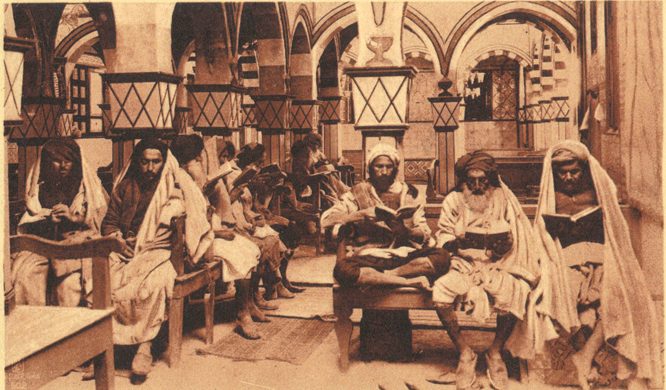
In 1895 Rabbi HaCohen married Msi'adah, a cousin on his mother's side, and the couple had 3 sons and 4 daughters. One of the sons, Rabbi Shushan HaCohen, after making Aliyah, was appointed the Rabbi of the village of Eitan in Israel.
When he was 25 was asked to accept membership in the Beit Din (Hebrew court) of Jerbah, but rejected arguing he didn't want to receive any goods from the public. Despite his rejection, over the years various propositions kept reaching him, to serve in various Rabbinic positions, sometimes with promises of major respected rewards, but he always rejected.
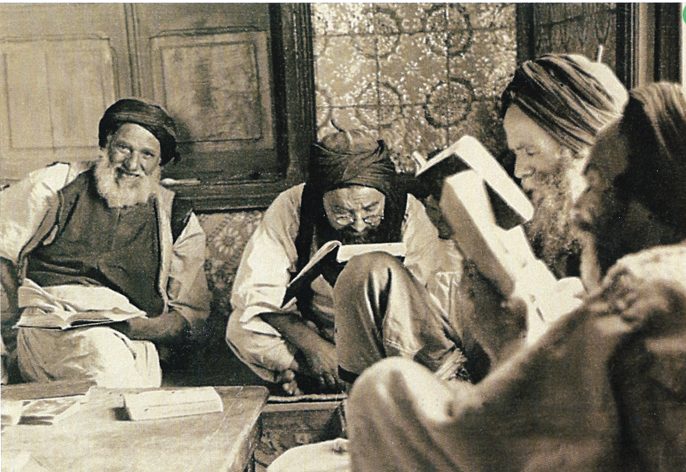
In 1917, at 43 years, was eventually appointed as a member of the Beit Din in Jerbah, however then as well rejected the offer to head the court, rather only as of the 3rd judge, and only at certain hours of the day. In practice, the conditions didn't fulfill, and all-day he was busy with almost all of Jerbah's cour carried on his shoulders. Several times considered leaving the position due to his health conditions and the load of work.


His leadership stood out at critical times when the Nazi invaders into Djerbah demanded 50kg of gold from the Jewish community. This was on Sabbath and he drove with them all over the Jewish neighborhoods, obliging every Jew to bring all the gold in possession.
At 75 Rabbi Calfon fell fataly ill. After a short improvement, he passed on Sabbath, 7th of June 1950. On the day of his burial, the surrounding towns were almost emptied of Jews, and the main marketplace in Jerbah (owned mostly by Jews) was closed. Tens of thousands, among whom were Tunisian and French governors took part in the funeral.
Was buried in Djerbah, but in 2005, 55 years after his passing, his bones were brought from Tunisia to Israel, and buried on the mountain of Menuhot in Jerusalem, by Rabbi Shalom Msas.
In the funeral procession that lasted 3 days, took part tens of thousands from Israel, Tunisia, and France, among them Rabbi Mordechai Elyahu and Rabbi 'Ovadiah Yosef.
Named after him, are various synagogues, schools, as well as streets in the cities of Netivot, Ashkelon, and a street in Jerusalem.
Due to the establishment of the 'Alliance' schools in Tunisia, objected with his cousin Rabbi Mordechai Amyas HaCohen against many, including Rabbi Yisrael Zayton, the Chief Rabbi of Tunisia, preferring to keep traditional Torah education. After the school was established, most Djerba residents listened to Rabbi Calfon, and didn't send their children to study there.
Despite opposing modernization in the Alliance schools, Rabbi Calfon was an enthusiastic supporter of the Zionist movement, despite knowing its central figures were far from tradition, he wrote -
"In our days, many of our brothers of the house of Israel though didn't grow up on the knees of Judaism, Torah, and commandments, and their judgment is as of abducted children among the nations. However, in their heart awakened a nationalist emotion, for the love of existence of the Israeli nation, and its persistence to be a separate nation from the nations of the world." - from the pamphlet "Geulat Mosheh" in his book "Zchut Mosheh".
Referring to Binyamin Zeev Herzl he wrote -
"In our days, an exalted man has risen among us, a man of character with a clear mind and sharp ideas, Binyamin Zeev Herzl is his name...came up with a wonderful idea, fo everyone to gather under the shade of the Zionist community and be called Zionists...and knocked on the gates of kings and counts - to take from them a clear ruling, for Eretz Yisrael to be for us as before".
In 1919 was among the founders of the Zionist movement "Ateret Zion" in Djerba, which acted in coordination with KKL and Keren HaYesod, to strengthen the Hebrew language, and her members were constantly updated about news from the land of Israel, through Hebrew newspapers like "HaLevanon", "HaMagid", "HaTzfirah" and "HaHavatzelet".
In his lesson during Shabat of Torah portion "Naso", 12th of Sivan, several days after the San Remo conference and confirmation of the Balfour Declaration by the League of Nations said that this was "the beginning of the redemption". He wrote and edited the lesson at the end of Shabat, and published it as the "The Fifth Sermon For The Beginning Of Redemption" in his book "Matte Mosheh", writing the following - "from now on there is no doubt this is the beginning of the redemption, and every man of Israel should thank thousands of time to G-d for the redemption and salvation, for G-d has commanded his nation and brought us from bondage to redemption".
Rabbi Calfon explained that getting familiar with Eretz Yisrael will significantly increase Aliyah, and in a vision, he wrote in the 1920s, suggested organizing visits of young Jews from around the world to Eretz Yisrael with the funding of the Zionist movement. A similar idea was fulfilled with the establishment of the "Taglit" organization in the year 2000.
Rabbi Calfon supported 'Aliyah and made sure the community members support the immigrants. He also called for purchasing parcels of land in the country and worked for the revival of the Hebrew language. With the establishment of the state of Israel, ruled for the Israeli Independence Day to be celebrated on the island of Djerba for entire 3 days.
In the year 1897, when at 24, tried for the first time to make 'Aliyah with the help of a friend from Tripoli, with whom he befriended during visits to cure his eyes. However, after the journey had already been organized, his father heard of this and wanted to talk him out of it, arguing that according to his counting the Mashiah comes in the year 1916 and he would wait till then. In order not to sadden his father Rabbi Mosheh Calfon HaCohen listened to his father and gave up on the opportunity to make 'Aliyah, an opportunity he regretted all his days.
In preparation for the 'Aliyah bought a parcel of land in the Beit HaCerem neighborhood in Jerusalem, and in his late days, while his health was precarious, decided to try making 'Aliyah once again. In the year 1949, he acquired a permit for 'Aliyah, and his son Shushan went to Tunis to order the documents. However, due to illness, his 'Aliyah was postponed as his health condition deteriorated, which didn't improve till his passing.
In his early writings, before the state of Israel was established, he judged detailed practical governmental ideas, not only in reference to the Zionist idea but also clearly cosmopolitan ideas.
Following the Russia-Japan war breaking out in 1904, Rabbi Calfon came to the conclusion, that Torah of Israel is not complete with only the liberation of Israel, but seeks to build a whole corrected world for all humanity. He formulated a wide cosmopolitan vision, which are mechanisms and institutions which will establish world peace. Due to his suspicion that his word won't be accepted, due to his status and the status of the relatively sideline country in which he lived, Rabbi Calfon archived the vision. An Arabic newspaper reached him 15 years later, revealing before him to his surprise similar political ideas to which he wrote about in 1905. Since then decided it was his duty to publish his ideas publically.
In the early 20s of the 20th century, Rabbi Calfon gave speeches in which he focused on the need to deal with international law, and formulated in detail a practical proposition for the establishment of a world government and the establishment of international law. He advanced mechanisms for solving international conflicts and formulated a political-state program including many goals.
Rabbi Calfon called for the establishment in Jerusalem of an international committee and an international court to examine the conduct of the countries according to the wellbeing of all humanity, to include representatives from all countries which together decide in international conflicts and prevent the use of force and violence. This idea, which was realized later with the establishment of the UN, included several additional ideas, among which, an International army to treat countries not willing to follow the counsel of the nations, a council to act for education to tolerance in a moral way, the idea for the establishment of a central world bank, which partial income will be leveraged to the poor of the countries, and an international currency for trade, which value is equal in all countries. The latter idea was realized as well, with the invention of the BitCoin, a couple of decades later.
Rabbi Calfon explained that the establishment of the major center of the international committee should be in Jerusalem, 'for there is great hope for all nations - we Jews, the Christians and Ishmaelites'.
With the strengthening of the movement for the return to Zion and the Belfour Declaration, the revival of the Hebrew language and the improvement of the conditions for Jews in developed countries Rabbi Calfon saw the beginning of the redemption age.
Rabbi Calfon saw technological development as a means for the world to become a global village, requiring the world countries to come to the help of countries in distress as part of mutual guarantee and world peace. The last term was also a religious obligation, and technological development symbolized in his view the basis for a higher spiritual level.
Among his books, more than 50 writings have been published dealing with all aspects of Judaism.

"הרב כלפון היה מנהיג ציוני שעודד סדר עולמי כלל אנושי"
מרכז דהאן למורשת קהילות ישראל עורך כנס המתמקד ביצירתם, פועלם והשפעתם שלחכמי תוניסיה בעת החדשה לרגל 70 שנים לפטירתו של אחד מגדולי רבני ג@@@רבהwww.maariv.co.il
Sixties Fan
Diamond Member
- Mar 6, 2017
- 67,433
- 12,054
- 2,290
Sixties Fan
Diamond Member
- Mar 6, 2017
- 67,433
- 12,054
- 2,290
Willer’s escape from Germany was hatched by his mother, Franziska Willer, after the Kristallnacht pogrom in 1938. Willer was previously married to a Christian man who left her in 1933 and later became a Nazi sympathizer. He committed suicide in 1964.
Through her brother, who was residing in London, and a pastor from Attlee’s area, it was arranged for Paul Willer to come live in the Attlee home for some four months.
“They took me inside what was a very large house,” Willer said of his first encounter with the Attlees. “They had a maid and a cook too. The next morning, their son Martin [the late Lord Attlee], who was my age, took me upstairs and ran a cold bath, bathed, and encouraged me to do the same. I thought, ‘Is this what they do for Easter?’ It turned out that cold baths were what the males in the family did every day.”
At the time, Attlee was composing his opposition to Nelson Chamberlain’s appeasement policy, according to The Guardian.
“He was a gentle man and a gentleman. He was very good with the children and affectionate. At breakfast, we would gather around the table and he played this game where he held out a coin and asked whose monarch’s head was on it. Whoever gave the correct answer was allowed to keep the coin,” said Willer.
As the war drew to an end in 1945, Attlee was elected prime minister, a post he held until 1951. He was preceded and succeeded in the position by Winston Churchill.
It was under his watch that the British Mandate was dissolved to make way for the State of Israel. Before the establishment of Israel, thousands of European Jews, many of them Holocaust survivors, were barred from settling in Palestine under British immigration policy.
(full article online)
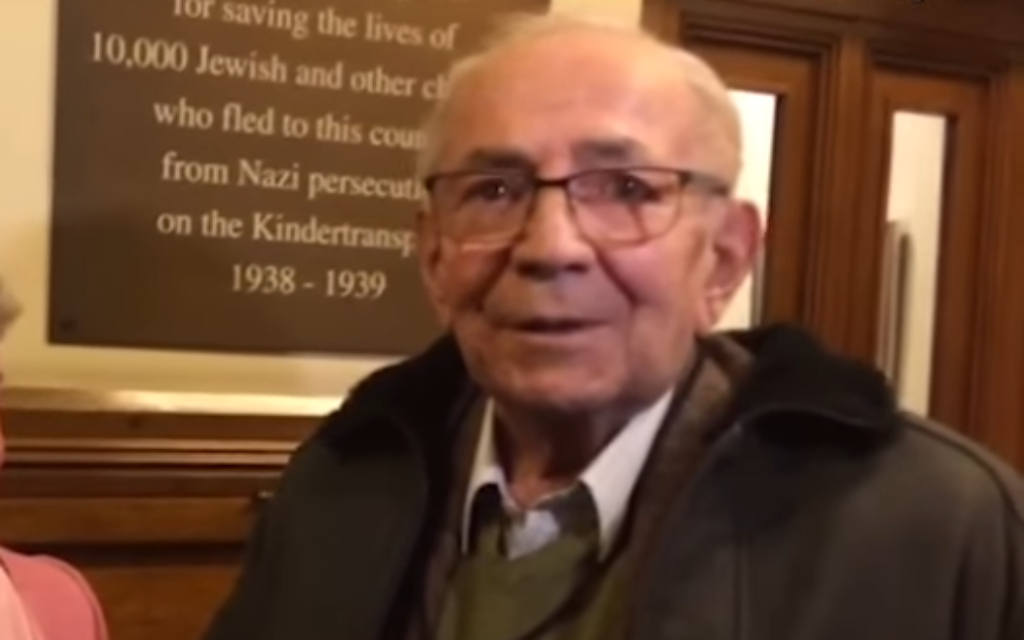
 www.timesofisrael.com
www.timesofisrael.com
Through her brother, who was residing in London, and a pastor from Attlee’s area, it was arranged for Paul Willer to come live in the Attlee home for some four months.
“They took me inside what was a very large house,” Willer said of his first encounter with the Attlees. “They had a maid and a cook too. The next morning, their son Martin [the late Lord Attlee], who was my age, took me upstairs and ran a cold bath, bathed, and encouraged me to do the same. I thought, ‘Is this what they do for Easter?’ It turned out that cold baths were what the males in the family did every day.”
At the time, Attlee was composing his opposition to Nelson Chamberlain’s appeasement policy, according to The Guardian.
“He was a gentle man and a gentleman. He was very good with the children and affectionate. At breakfast, we would gather around the table and he played this game where he held out a coin and asked whose monarch’s head was on it. Whoever gave the correct answer was allowed to keep the coin,” said Willer.
As the war drew to an end in 1945, Attlee was elected prime minister, a post he held until 1951. He was preceded and succeeded in the position by Winston Churchill.
It was under his watch that the British Mandate was dissolved to make way for the State of Israel. Before the establishment of Israel, thousands of European Jews, many of them Holocaust survivors, were barred from settling in Palestine under British immigration policy.
(full article online)

Jewish refugee who fled Nazis, was hosted by future British PM Attlee, dies at 94
In 1939, then-opposition leader opened home to 10-year-old Paul Willer, who left Germany with mother and brother; Attlee never spoke of the story
Sixties Fan
Diamond Member
- Mar 6, 2017
- 67,433
- 12,054
- 2,290
In January 1939, the London Times published documents such a letters and reports of Arab terrorists found at Bani Naim by British forces. The Palestine Post then republished the story on January 25, 1939.

The highlight was the extensive use made of the Haram A-Sharif compound as a base for the terrorist gangs, sniping positions, arms storerooms, etc. as well as the presence, within the compound, of security personnel of the Mandate.
An extract:
The following day, the paper's editorial read, in part:
(full article online)
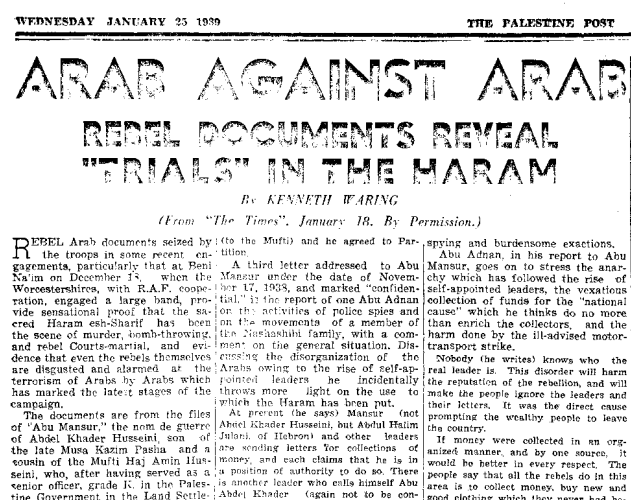
 myrightword.blogspot.com
myrightword.blogspot.com

The highlight was the extensive use made of the Haram A-Sharif compound as a base for the terrorist gangs, sniping positions, arms storerooms, etc. as well as the presence, within the compound, of security personnel of the Mandate.
An extract:
Rebel Arab documents seized by the troops in some recent engagements,, particularly that at Beni Na'im on December 15, when the Worcestershires. with R.A.F. cooperation, engaged a large band, provide sensational proof that the sacred Haram esh-Sharif has been the scene of murder, bomb-throwing, and rebel courts-martial, and evidence that even the rebels themselves are disgusted and alarmed at the terrorism of Arabs by Arabs which has marked the lateit stages of the campaign.
The documents are from the files of 'Abu Mansur," the nora de guerre of Abdel Khader Husseini. With such evidence as this of the Moslems' violation of their own sanctuary, and the proof , witnessed by members of the Moslem Supreme Council , after the recapture' of the old city of Jerusalem on October 19, that the Haram has been used as a vantage point for snipers. As the sheikhs have locked the old police post next to the Dome of the Rock, the present post has been placed in a sheikh's room farther from the sacred rock...
The following day, the paper's editorial read, in part:
From The Times Archives, thanks to EV:the desecration of the Haram esh Sharif for terrorist attacks both against individual Arabs and against the police and the troops.The propaganda agents of the Mufti and their helpers in the foreign press launched a wide campaign of insinuation and slander against the security authorities in this country when the latter found themselves obliged to station a small post of Moslem and British police in the Haram area in order to prevent its being used as a point of vantage for gunmen. It is now revealed from the files of the terrorist leaders themselves that not only was the Haram turned into a haunt of snipers, but that it also served as a venue of trials by terrorist "courts" and that the "holy warriors" murdered fellow Arabs within its sacred precincts.
(full article online)

An Historical Desecration of the Haram A-Sharif
In January 1939, the London Times published documents such a letters and reports of Arab terrorists found at Bani Naim by British forces. Th...
Sixties Fan
Diamond Member
- Mar 6, 2017
- 67,433
- 12,054
- 2,290
rylah
Gold Member
- Jun 10, 2015
- 23,386
- 4,950
- 290
Rabbi Yehudah Bivas - Binyamin Herzl link to Rabbi Hayyim Ben-Attar
and the role of Moroccan Jewry in initiating the Zionist revolution
| Lesson series by Rabbi Mosheh Elharar
What You see here is the picture of Rabbi Yehudah Bibas Z"l, the grandson of Rabbi Hayyim Ben-Attar HaKadosh, who had only daughters.
Some take in the nonsense, maybe intentionally that he had neither sons nor daughters, this is incorrect. For example here is the book about Rabbi Meir Yehudah Getz, and on the 1st page of the book (after all the forewards), the 1st line: "HaRav Meir Yehudah Getz, born 15 Av 5684 (1924), to his parents HaRav Tzemah Getz and Rabbanit Simhah Mas'oudah Getz, descendants of Rabbi Hayyim Ben-Attar, author of the renowned commentary 'Or HaHayyim' HaKadosh".
Here in the book is not written how he's specifically linked to Or HaHayyim HaKadosh. I have asked a great friend of mine, Dr. Shlomah Sheish, who lives in the village of El'azar in Gush 'Atzion, who was also a regular doctor, surgeon, obstetrician, expert in pediatrics, then an expert in Chinese and various other treatment methods he brought to the country. Dr. Shlomah Sheish is a student of HaRav Getz, the Rabbi of the Kotel (Western Wall), I've asked him about the link to the descendants of HaKaDosh Rabbi Hayyim Ben-Attar? He says he has always heard from him that he was 7th generation, son after son from the daughter Rabbi Hayiim Ben-Attar. His daughter Rahel, he's the 7th generation, descendant of Rabbi 'Or HaHayyim' HaKadosh.
Dr Shleish told me, now I call the Gaon HaRav Yisrael Avihay, the chair of the Kabalist Yeshivah 'Beit El' in the ancient city of Jerusalem, he took the chair after HaRav Getz who was the chair of the Yeshivah prior to him, and he confirmed, especially on the day of his Hillulah. And HaRav says 'look at his gravestone, it's not as at the beginning of the book, it says HaRav Meir Yehudah Getz' he says, 'incorrect, look at his gravestone - HaRav Meir Yehudah Nahum Hayyim Getz, why Hayyim? Hayyim is after the name of 'Or HaHayyim' HaKadosh Rabbi Hayyim Ben-Attar, he's 7th generation to Or HaHayyim HaKadosh.
And Rabbi Yehudah Bivas, the son of HaRav Shmuel Bivas, passed away 120 years ago, and he following his grandfather saw the horrific troubles done to his grandfather 'Or HaHayyim' HaKadosh, so he left and ran away from Sali to Gibraltar and established there a Yeshivah in Gibraltar.
This started from his father, HaRav Shmuel Bivas then passed to his son, who later was in Livorno and went around Europe, why? Following his grandfather, who said what? The moment trouble rises abroad to leave everything.
The Torah portion 'Balak' is on the week of the passing of 'Or HaHayyim HaKadosh, let's see what he writes. Bil'am wants to curse Israel that they don't merit a kingdom, that the kingdom doesn't last long for the nation of Israel. Anf of course the sages say in Gmarah, that the blessings of Bil'am are what he wanted to curse Israel. What does he bless Israel with, yet reluctantly -
"What I see for them is not yet,
What I behold will not be soon:
A star rises from Jacob,
A scepter comes forth from Israel;"
Meaning, "A star rises from Jacob", says Or HaHayyim HaKadosh, that the redemption of the nation of Israel can be as a big star, as in suddenly appearing in the heavens, which is a sped-up miraculous redemption, like the exodus of Egypt, everything this manner is redemption sped-up. This is when the nation of Israel merits ideal unity and love, no despise or neglect, ideal respect for each other, the redemption is sped-up, up as a star that rises in the heavens suddenly and miraculously.
But the manner of redemption can be different, sped-up how?
"A scepter (also tribe) comes forth from Israel", meaning, Or HaHayyim HakaDosh says, "that one tribe rises from Israel in a normal worldly way, through the nature". Through the nature, means the need to go reach the UN, and reach the world nations, get their agreement, and the need for war, need for the establishment of military and state and great devotion to Torah.
Rabbi 'Amram Abourabiyah who had a great devotion to Torah, used to say to his sons and grandsons who are all themselves devoted to Torah, but this is not enough, to establish the kingdom, says Or HaHayyim HaKadosh - everything through nature.
To establish the kingdom in Israel, there is a need also for science, need for wisdom, of course, Torah has to lead everything, therefore the Rabbi's father advised him on what to do, he told him to study, and he became one of the greatest atomic physicists in the world, all by the support of the father HaRav 'Amram Abourabiyah, the way of Rabbi Or HaHayyim Ben-Attar, who says it's all through the nature.
And following Or HaHayyim HaKadosh, following Rabbi Yehudah Bivas, who came to Yaffo, he was 50 years before Herzl and had an influence by leaving a detailed political plan. And HaRav Yehudah Elkal'ey who quotes him in his books, in Zemlin Yugoslavia.
Professor Zeev Vilnaee says this as well, HaRav Yehudah Bivas together with HaRav David Ben-Shim'on came to Yaffo -and they are the pioneers of the establishment of Eretz Yisrael, before the 1st and the 2nd Aliyah and the rest. They prepared the infrastructure for all the future Aliyah to Eretz Yisrael.
This is Rabbi Yehudah Bivas the grandson of Rabbi Hayyim Ben-Attar, following the grandfather. And HaRav David Yehudah Shim'on who came from Rabat, he writes the book 'Sha'ar HeHatzer' (the gate of the court'). The student of Rabbi Yehudah Bivas is Rabbi Aharon Shloush, who builds the 1st house in Yaffo and all of Tel Aviv, villages, and cities today in Gush Dan region started from Rabbi Yehudah Bivas.
His students, Rabbi Avraham Shloush, and Rabbi Aharon Shloush had purchased 800 dunams. How does Rabbi David Ben Shim'on start the book 'Sha'ar HeHatzer'? "Everyone must buy land in Eretz Yisrael if they want a part in the world to come".
As I've taught in the lesson about Ya'akov Avinu A"H, "and purchased the parcel of the field" (Beresheet 33), Ya'akov Avinu the first thing in Eretz Yisrael, purchases a parcel of land - there's trouble, leave the exile, purchase a dunam of land in Eretz Yisrael, and the parcel of the field in Eretz Yisrael brings the person to his part in the world to come, this is Torah portion 'Vayishlah' in the Zohar, and this how the book 'Sha'ar HeHatzer' starts, in which 613 differences between Eretz Yisrael and abroad.
And I'm wondering how some wise students in our generation try to be pedantic about certain traditions but not this great thing - that the time has come, the nation of Israel must return to the land of Israel, build it, and we need Torah in devotion, and army and state and all the rest. How does one leave the teaching of all these sages and all who followed Or HaHayyim HaKadosh.
We should know about Rabbi 'Amram Abourabiyah, what he wrote and taught daily - Or HaHayyim HaKadosh was his table book, and he translated it into action. I've given separate lessons on how he merited in his holy spirit to envision all the redemption of the nation of Israel. He wrote 5 months before it happened, how the soldiers of the Israel Defense Forces liberate Jerusalem - and we, with the help of HaShem, in the merit of these sages, that we learn from their ways, learn their teaching to merit the full redemption quickly in our days amen!
Sixties Fan
Diamond Member
- Mar 6, 2017
- 67,433
- 12,054
- 2,290
This is the 74th anniversary of the surrender of the Old City of Jerusalem.
This article shows how both the Jordanians and the Swiss acted like the Arabs were supreme humanitarians - because they didn't massacre every man, woman and child and "allowed' them to leave their homes with only a few possessions.

This was ethnic cleansing.
Not a single Jew remained in the Jordanian administered part of Jerusalem for 19 years. But since Arabs are assumed to be vicious animals, when they act a little less horribly, everyone praises them.
And in another article in the Palestine Post on May 30, 1948:

Of course, within days some 50 synagogues were deliberately destroyed by the humane Transjordanians.
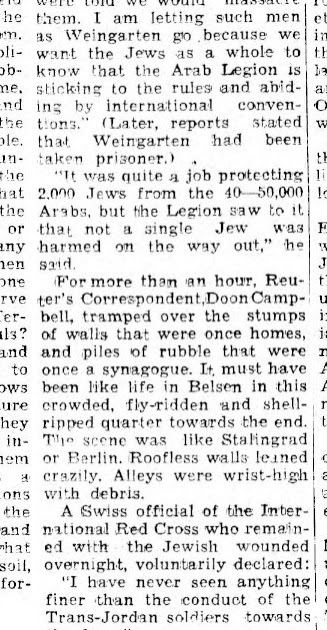
 elderofziyon.blogspot.com
elderofziyon.blogspot.com
This article shows how both the Jordanians and the Swiss acted like the Arabs were supreme humanitarians - because they didn't massacre every man, woman and child and "allowed' them to leave their homes with only a few possessions.

This was ethnic cleansing.
Not a single Jew remained in the Jordanian administered part of Jerusalem for 19 years. But since Arabs are assumed to be vicious animals, when they act a little less horribly, everyone praises them.
And in another article in the Palestine Post on May 30, 1948:

Of course, within days some 50 synagogues were deliberately destroyed by the humane Transjordanians.

74 years ago: World compliments Arabs on how humanely they ethically cleansed Jews from Jerusalem
Blogging about Israel and the Arab world since, oh, forever.
Sixties Fan
Diamond Member
- Mar 6, 2017
- 67,433
- 12,054
- 2,290
Tinmore gave this post a "Thanks".This is the 74th anniversary of the surrender of the Old City of Jerusalem.
This article shows how both the Jordanians and the Swiss acted like the Arabs were supreme humanitarians - because they didn't massacre every man, woman and child and "allowed' them to leave their homes with only a few possessions.
This was ethnic cleansing.
Not a single Jew remained in the Jordanian administered part of Jerusalem for 19 years. But since Arabs are assumed to be vicious animals, when they act a little less horribly, everyone praises them.
And in another article in the Palestine Post on May 30, 1948:
Of course, within days some 50 synagogues were deliberately destroyed by the humane Transjordanians.

74 years ago: World compliments Arabs on how humanely they ethically cleansed Jews from Jerusalem
Blogging about Israel and the Arab world since, oh, forever.elderofziyon.blogspot.com
Being a fake humanitarian is ok with Tinmore.
Because ethnically cleansing all Jews from their ancient homeland is totally ok with all antisemitic fools like Mr. T.
Bravo for the fake good samaritans of the "Palestinian People"
After all, hating Jews, and kicking them out from anywhere in the world, is an impossible habit to break.
Sixties Fan
Diamond Member
- Mar 6, 2017
- 67,433
- 12,054
- 2,290
The blog at Israel's National Library put out an interesting post:
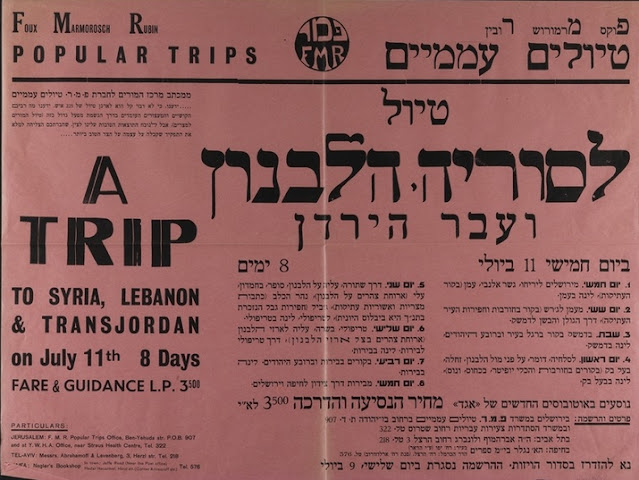

Jewish tourists were so desirable that Lebanese hotels competed by offering kosher food:

I found this 1932 article in the Palestine Bulletin about a successful trip to Lebanon and Syria:

The YWHA sponsored many of these trips, and also went to Egypt (1933):
(full article online)

 elderofziyon.blogspot.com
elderofziyon.blogspot.com
They show advertisements to visit Lebanon, Syria and Transjordan:Just as Jewish merchants moved between Jerusalem, Damascus, Halab, and Beirut during the days of the Ottoman Empire, citizens of Mandatory Palestine – both Jews and Arabs – continued to visit their northern neighbors while living under British rule. The local tourist industry in particular, flourished during this period. Lebanon was considered a fascinating and attractive destination: its southern shores, the vibrant metropolis of Beirut and the beautiful snow-capped mountains – a rare sight in the Middle East. The Hebrew press and bulletin boards were filled with advertisements appealing to the Jewish readers to come and relax in Lebanon.


Jewish tourists were so desirable that Lebanese hotels competed by offering kosher food:

I found this 1932 article in the Palestine Bulletin about a successful trip to Lebanon and Syria:

The YWHA sponsored many of these trips, and also went to Egypt (1933):
(full article online)

Palestine Jews were encouraged to visit Lebanon, Syria, Transjordan and Egypt in the 1920s-40s
Blogging about Israel and the Arab world since, oh, forever.
Sixties Fan
Diamond Member
- Mar 6, 2017
- 67,433
- 12,054
- 2,290
In November 1917, Sassoon was passed fit for service. He was sent to Ireland where he served until February 1918 and was then transferred to Palestine as part of General Allenby’s army. He hated it there and described Jerusalem as ‘not a very holy-looking place’ and referred to the natives as ‘Hebrews’. His vague Jewish connections through his father meant nothing to him. After three months in Palestine, Sassoon returned to the Western Front.
(full article online)

 myrightword.blogspot.com
myrightword.blogspot.com
(full article online)

When Siegfried Sassoon was in Palestine at the Same Time as Jabotinsky
Siegfried Sassoon (1886 – 1967) was a scion to the wealthy India Jewish merchant family on his father's side with his mother being Anglican,...
Sixties Fan
Diamond Member
- Mar 6, 2017
- 67,433
- 12,054
- 2,290
One hundred years ago this week, the United States Congress unanimously embraced Zionism. The story of how that came about involves some surprising twists and turns, and a stormy debate about Jews and Arabs that could have been taken straight out of today’s headlines.
In the spring of 1922, the League of Nations—forerunner of the United Nations—was weighing Great Britain’s request to be granted the mandate over Palestine. The approval process was slowed as France and Italy jockeyed for regional influence and the Vatican sought to prevent Jews from gaining a “privileged” position or “preponderant influence” in the Holy Land.
In the wake of England’s 1917 Balfour Declaration, pledging to facilitate creation of a Jewish national home, American Zionists were eager to see the British receive the Palestine mandate. They hoped an endorsement of Zionism by President Warren Harding would accelerate the process. But Harding proved noncommittal, so Zionist activists turned to Congress.
Senators Henry Cabot Lodge, of Massachusetts, and Charles Curtis, of Kansas (a future vice president) and Rep. Hamilton Fish, Jr., of New York, all Republicans, agreed to take the lead on a pro-Zionist resolution. They were isolationists and immigration restrictionists—not exactly the Jewish community’s favorite kind of politicians. Rabbi Stephen S. Wise, head of the American Jewish Congress, had recently denounced Lodge as “un-American and anti-American” because he opposed U.S. participation in the League of Nations.
Successful lobbying, however, is the art of the possible. Many Jewish leaders may have been personally more comfortable with Democrats, but in 1922, the president was Republican and the GOP enjoyed large majorities in both the Senate and the House of Representatives. If three powerful Republican congressmen were ready to champion the Zionist cause, why should they be turned away?
The Lodge-Fish resolution, as it came to be known, declared that “the United States of America favors the establishment in Palestine of a national home for the Jewish people.” It added that “the civil and religious rights of Christian and all other non-Jewish communities in Palestine” and “the holy places and religious buildings and sites” should “be adequately protected.”
Hearings were held before the House Committee on Foreign Affairs over four days in April.
The testimony by Zionist officials emphasized both justice and rescue. The Jewish people were entitled to rebuild their biblical homeland, and European Jews urgently needed a haven; 100,000 Jews had been slaughtered in pogroms in Ukraine and Poland in 1918-1921. Moreover, Zionist development of the land would benefit Palestine’s Arab population.
Two Arab-American activists, Selim Totah and Fuad Shatara, appeared as witnesses. Their extremism and conspiracy theories won them little sympathy. Totah claimed the British administration in Palestine was “in the hands of the Jews.” Shatara said the suffering of Jewish pogrom victims in Europe was “nothing to compare” with the burden of heavy taxes that Palestine’s Arabs endured under Turkish rule. Both men insisted that they were not antisemitic—Totah because “I have a lot of Jewish friends,” Shatara because “I am a Semite myself.”
Then as now, Jewish anti-Zionists were front and center in the debate. Two prominent Reform rabbis, Isaac Landman of New York and David Philipson of Cincinnati, testified against Lodge-Fish, claiming the resolution could endanger the status of American Jews. “We resent the idea that the Jews constitute a nation,” Landman argued. “America is my national home.”
The anti-Zionist publishers of the New York Times were among the most vociferous critics of the resolution. A Times editorial warned that Lodge-Fish could turn American Jews into “hyphenated citizens.” The Times also highlighted the alleged misbehavior of radical Jewish settlers; it published reports from its Palestine correspondent claiming that Arab violence against Jews was “stirred up” by “Jewish Bolshevists.”
Another aspect of the episode with contemporary echoes was the role of prominent academics. Yale professor Edward Bliss Reed testified at the congressional hearings that the Balfour Declaration was the product of a Zionist-British conspiracy, complete with secret additional paragraphs that supposedly were being withheld from public view.
In speeches and writings around the same time, Harvard professor Albert Bushnell Hart called Zionism “a dangerous doctrine” and demanded that American Jews either renounce it or surrender their U.S. citizenship. Princeton’s Henry Adams Gibbons, explaining his opposition to Zionism, wrote: “We do not hold in abhorrence the Jews, but we do hold in abhorrence the Jewish nation.”
Despite the critics, the Lodge-Fish resolution received overwhelming bipartisan support. It was unanimously adopted by the Senate on May 3 and the House on June 30, and signed by President Harding later that year.
(full article online)
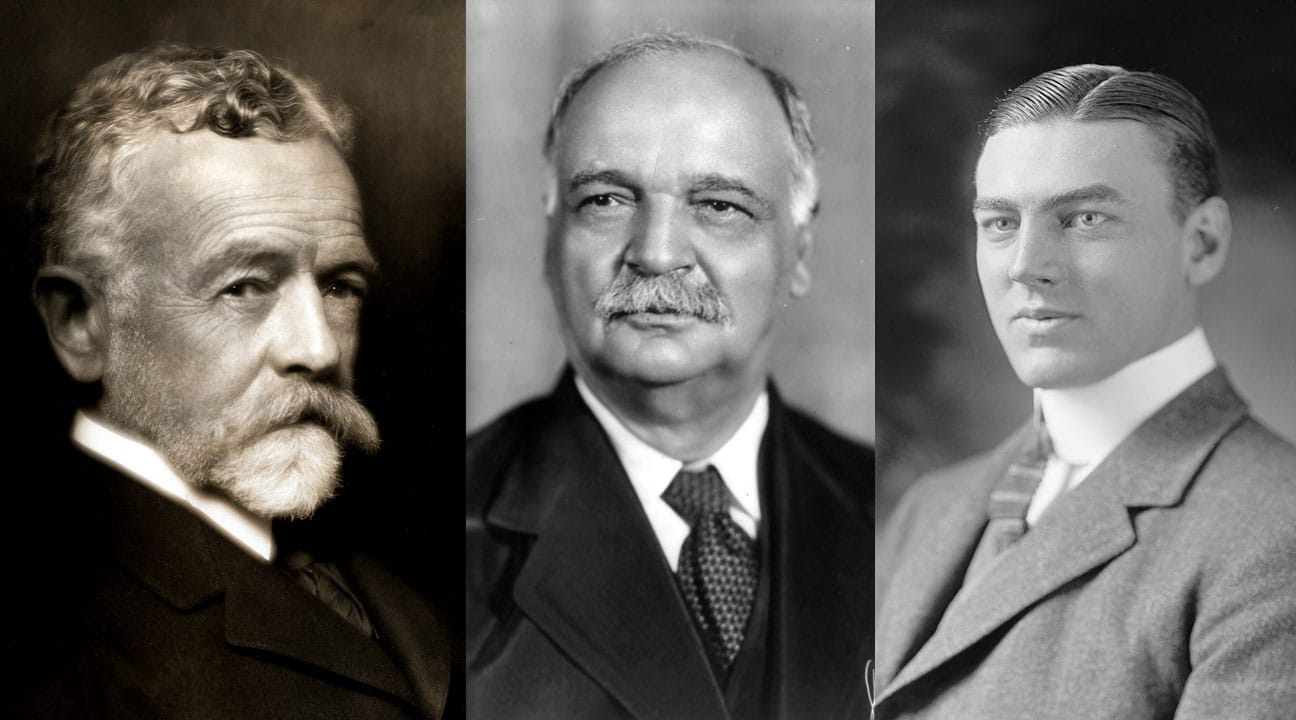
 jewishjournal.com
jewishjournal.com
In the spring of 1922, the League of Nations—forerunner of the United Nations—was weighing Great Britain’s request to be granted the mandate over Palestine. The approval process was slowed as France and Italy jockeyed for regional influence and the Vatican sought to prevent Jews from gaining a “privileged” position or “preponderant influence” in the Holy Land.
In the wake of England’s 1917 Balfour Declaration, pledging to facilitate creation of a Jewish national home, American Zionists were eager to see the British receive the Palestine mandate. They hoped an endorsement of Zionism by President Warren Harding would accelerate the process. But Harding proved noncommittal, so Zionist activists turned to Congress.
Senators Henry Cabot Lodge, of Massachusetts, and Charles Curtis, of Kansas (a future vice president) and Rep. Hamilton Fish, Jr., of New York, all Republicans, agreed to take the lead on a pro-Zionist resolution. They were isolationists and immigration restrictionists—not exactly the Jewish community’s favorite kind of politicians. Rabbi Stephen S. Wise, head of the American Jewish Congress, had recently denounced Lodge as “un-American and anti-American” because he opposed U.S. participation in the League of Nations.
Successful lobbying, however, is the art of the possible. Many Jewish leaders may have been personally more comfortable with Democrats, but in 1922, the president was Republican and the GOP enjoyed large majorities in both the Senate and the House of Representatives. If three powerful Republican congressmen were ready to champion the Zionist cause, why should they be turned away?
The Lodge-Fish resolution, as it came to be known, declared that “the United States of America favors the establishment in Palestine of a national home for the Jewish people.” It added that “the civil and religious rights of Christian and all other non-Jewish communities in Palestine” and “the holy places and religious buildings and sites” should “be adequately protected.”
Hearings were held before the House Committee on Foreign Affairs over four days in April.
The testimony by Zionist officials emphasized both justice and rescue. The Jewish people were entitled to rebuild their biblical homeland, and European Jews urgently needed a haven; 100,000 Jews had been slaughtered in pogroms in Ukraine and Poland in 1918-1921. Moreover, Zionist development of the land would benefit Palestine’s Arab population.
Two Arab-American activists, Selim Totah and Fuad Shatara, appeared as witnesses. Their extremism and conspiracy theories won them little sympathy. Totah claimed the British administration in Palestine was “in the hands of the Jews.” Shatara said the suffering of Jewish pogrom victims in Europe was “nothing to compare” with the burden of heavy taxes that Palestine’s Arabs endured under Turkish rule. Both men insisted that they were not antisemitic—Totah because “I have a lot of Jewish friends,” Shatara because “I am a Semite myself.”
Then as now, Jewish anti-Zionists were front and center in the debate. Two prominent Reform rabbis, Isaac Landman of New York and David Philipson of Cincinnati, testified against Lodge-Fish, claiming the resolution could endanger the status of American Jews. “We resent the idea that the Jews constitute a nation,” Landman argued. “America is my national home.”
The anti-Zionist publishers of the New York Times were among the most vociferous critics of the resolution. A Times editorial warned that Lodge-Fish could turn American Jews into “hyphenated citizens.” The Times also highlighted the alleged misbehavior of radical Jewish settlers; it published reports from its Palestine correspondent claiming that Arab violence against Jews was “stirred up” by “Jewish Bolshevists.”
Another aspect of the episode with contemporary echoes was the role of prominent academics. Yale professor Edward Bliss Reed testified at the congressional hearings that the Balfour Declaration was the product of a Zionist-British conspiracy, complete with secret additional paragraphs that supposedly were being withheld from public view.
In speeches and writings around the same time, Harvard professor Albert Bushnell Hart called Zionism “a dangerous doctrine” and demanded that American Jews either renounce it or surrender their U.S. citizenship. Princeton’s Henry Adams Gibbons, explaining his opposition to Zionism, wrote: “We do not hold in abhorrence the Jews, but we do hold in abhorrence the Jewish nation.”
Despite the critics, the Lodge-Fish resolution received overwhelming bipartisan support. It was unanimously adopted by the Senate on May 3 and the House on June 30, and signed by President Harding later that year.
(full article online)

100 Years Ago This Month: When Congress Embraced Zionism—Unanimously
One hundred years ago this week, the United States Congress unanimously embraced Zionism.
 jewishjournal.com
jewishjournal.com
rylah
Gold Member
- Jun 10, 2015
- 23,386
- 4,950
- 290
Morocco and the cause of Zionism
Sixties Fan
Diamond Member
- Mar 6, 2017
- 67,433
- 12,054
- 2,290
Keren Hayesod (Palestine Foundation Fund) was established in 1920 in London, England, to finance the Zionist movement’s work to bring about the return of the Jewish people to the Land of Israel. Leading figures from Chaim Weizmann to Ze’ev Jabotinsky were involved in its fundraising efforts. Keren Hayesod helped raise the seed money to establish the Hebrew University and the Israel Philharmonic Orchestra. It also helped develop the Haifa Bay suburbs to settle German Jewish refugees in the 1930s, and established dozens of communities to house the waves of immigrants after Israel’s creation. It continues to serve as a link between the people of Israel and Jewish communities around the world. This plaque recognizes a contribution made 100 years ago.
(full article online)

 thecjn.ca
thecjn.ca
(full article online)

Treasure Trove: A weekly piece of our history from the collection of David Matlow—second year archive (2022-23) - The Canadian Jewish News
The latest items via @TheCJN on Instagram.
 thecjn.ca
thecjn.ca
Sixties Fan
Diamond Member
- Mar 6, 2017
- 67,433
- 12,054
- 2,290

Anton Alexander writes in Malaria World Journal about the remarkable achievement of Zionists, specifically Dr. I. Kligler, in eliminating malaria from Palestine - the first time such an accomplishment was achieved on a national scale, anywhere. The methods that were successful then are not being copied now in areas that are still rife with the disease, and Alexander believes that this is largely because so many do not want to accept the scope of this Zionist achievement and instead pretend that a Palestinian state could have arisen on its own had Jews not moved to the region and created such solutions.
After the defeat by the British Army of the Turkish Army in 1918, in the final year of World War I, Palestine was administered by the British Mandate, in effect a colony-like structure. It is little appreciated today that Palestine was then thinly populated or even uninhabitable in many areas. Indeed, Palestine was then almost empty. It is also usually not appreciated that if malaria had not been eliminated in Palestine, it is doubtful the State of Israel could ever have come into existence.
The following brief extract from a previous paper may assist in appreciating the severity of the malaria that existed in Palestine 100 years ago.
In 1919, Dr. Manson-Bahr, a future director of the London School of Hygiene and Tropical Medicine, described Palestine as one of the most highly malarious countries in the world. He knew the conditions in Palestine as in 1918, in the final months of WWI, whilst an officer in the Royal Army Medical Corps with the British Army in Palestine, he had witnessed a force of 40,500 men lose 20,427 men in 9 weeks due to malaria. Of the 100,000 Turkish prisoners-of-war taken after their defeat in 1918 by the British Army in Palestine, 20 per cent had to be hospitalised immediately, suffering from malaria.
...For many years, historical narratives have been promoted providing a hostile account of the creation of the State of Israel in 1948 from out of Palestine. These narratives have often assumed the form of the Emperor’s New Clothes, misleadingly omitting reference to the malaria which devastated the country. Such narratives for years have thereby provided an incorrect impression that malaria in Palestine 100 years ago did not exist. In effect, it may have been an attempt to make the disease invisible!
The world has been done a great disservice by the failure before now to declare ‘the emperor is wearing nothing at all’, to call out that Palestine 100 years ago was drenched in malaria, that it was accordingly uninhabitable in many areas. Palestine, in fact, had become desolate and neglected in many areas, and was then almost empty of inhabitants. The method and approach begun by the Zionists in 1922 to eliminate malaria in Palestine were successful, there was much to learn from the method, and the lessons from that malaria elimination are still relevant around the world and could still be applied today.
Due to the omission of reference to malaria in these misleading narratives, today’s malaria-community is likely to be unaware of the steps taken in the successful malaria elimination in Palestine all those years ago and which experience could be saving lives today. Sadly, it is likely such misleading narratives by these malaria omissions will have done harm, costing many lives over the years throughout the world today wherever malaria has existed.
Dr. Kliger's methods were respectful to all inhabitants of the land, Arab and Jew, and education was key. Alexander wonders whether today's approaches to control malaria have the same respect for the inhabitants that the Zionists did a century ago.
But before such instruction or education could take place, it was necessary firstly to interest the inhabitants in malaria control or elimination, to cause the inhabitants to realise that a death from malaria was not just a fact of life. Instead, the inhabitants had to realise that such a death was a tragedy. The inhabitants had to believe malaria was not inevitable, therefore fatalism had to be overcome. The commencement of the successful Zionist malaria elimination in Palestine 100 years ago was a demonstration of an effective engagement with the community. Palestine was one of the first places to throw off some of the world’s old colonial attitudes which it did by engaging with dignity and respect all the inhabitants (both Arabs and Jews). This resulted in an extraordinarily strong and resilient cooperation by the inhabitants, Jews and Arabs, in the necessary anti-malaria works, lasting for years and years, and which cooperation was to rid the country of the disease.
I ponder the point and ask the question to the malaria-community: Are inhabitants today truly treated with respect and dignity? Is the approach and engagement with inhabitants the same that each one in the malaria community would honestly want for themselves? Is there a whiff of old-style patronage about the malaria community’s approach?
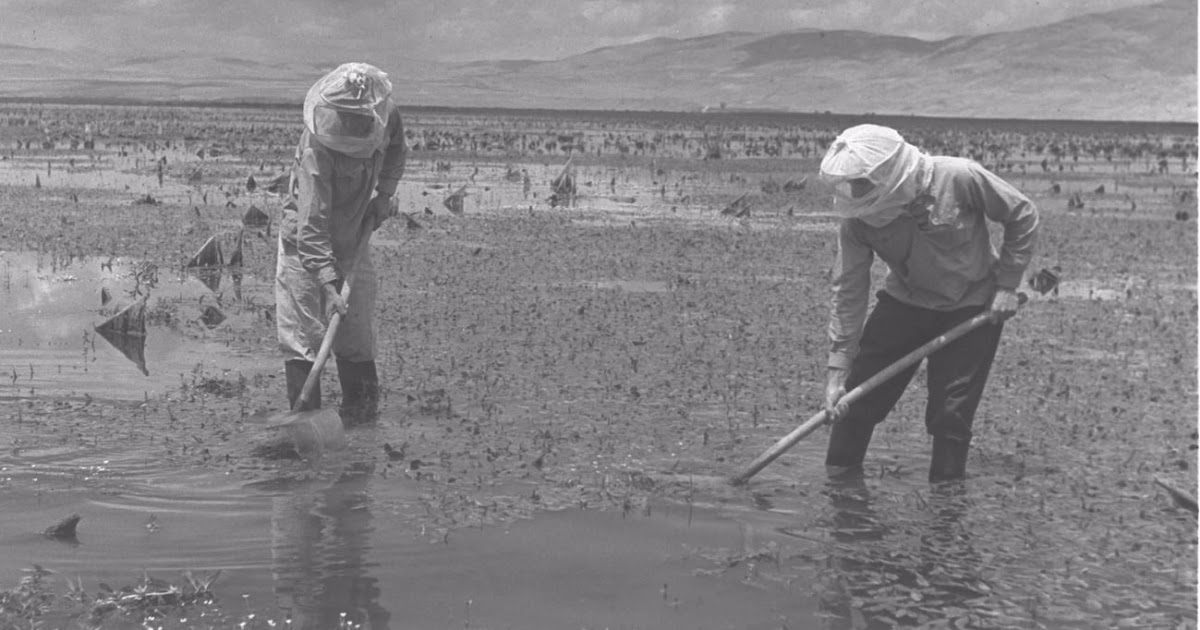
The world chooses to forget the amazing Zionist achievement to eliminate malaria from Palestine
Blogging about Israel and the Arab world since, oh, forever.
Sixties Fan
Diamond Member
- Mar 6, 2017
- 67,433
- 12,054
- 2,290
Part 1
Nikos Kazantzakis (1883-1957) was the famed 20th century Greek writer whose novels included Zorba the Greek and The Last Temptation of Christ.
In 1926 and 1927, he traveled to Palestine and wrote of his experiences.
He had a very telling conversation with a young Jewish woman where he - less than a decade before the rise of Nazism - claimed that Zionism was a disaster in the making because Jews belong in the diaspora, forever.
Even though he professed his love for Jews, he proved himself to be a racist and, in hindsight, his young adversary bested him.
-------------
We walked along the broad, dusty road bordering the Valley of Josephat at the foot of the Mount of Olives. The tombstones on the Jewish graves, deeply imbedded in the ground, were drowned in the glaring noonday light. The little village of Gethsemane, just two paces ahead, was blotted out in darkness, so blinding was the brilliance of the sun. Unexpectedly, there among the graves, two camels filed silently by, one behind the other, their necks swaying slowly. For a moment their patient black eyes, with the long lashes, gazed at us gently and my heart lightened as I felt the presence of a warm living thing moving through this inhuman wilderness.
Walking and breathing easily beside me in this furnace was a young Jewess, a teacher named Judith, who had come to show me a garden for Jewish children. She was about twenty years old, short, lissom, with hooked nose and restless jet-black eyes. Her hair was curly and coarse, her chin broad, firm, wilful.
“How did you happen to become a Zionist?” I asked.
“I was studying medicine. I had no ties to either religion or country. People had always interested me. I felt compassion and pity for all mankind, knowing how every one shares in illness and joy and grief. But I was restless. All of Europe seemed old and familiar and archaic to me. I was thirsty for something new. And so I came to Palestine.”
“Why didn't you go to Russia? They say a new world is being created there . ."
“Because there's no freedom there. A small, harsh circle governs all the others. The fact that this circle is the proletariat didn't comfort me at all. I wanted freedom.”
“And you found it here in Palestine?”
“Here we work free. We try, we experiment, we search to find. You can meet people here and work together according to your individual temperament - from the most revolutionary to the most conservative. Freedom. Here, for the first time. I feel alive, strengthened, able to love the earth that I had never even noticed in Europe, and able to feel joy that I am from the Jewish race.”
“You are beginning, in other words, to lose your freedom. You're beginning to tie yourself down to a certain corner of the Earth, and to constrict your heart; first it had room for all the world, now it's beginning to distinguish and choose and to accept only the Jews. Don't you feel the danger?”
The Jewess protested angrily, slightly fearful:
“What danger?”
“What danger? I'll tell you: The leader of the gypsies forbids his people to build houses or plant trees or put up fences. They prop up their tents on the ground for a while and then move on freely. One day, as they were taking down their tents, a young girl was bending over the earth and tarrying. The leader approached and saw the girl had broken his order and had planted a sprig of basil at the entrance of her tent. And now the little sprig of basil had blossomed and the young girl was crouched over it crying, reluctant to leave it. In a rage, the leader uprooted the basil and trampled on it. He struck the girl with his riding whip and shouted: ‘Why do you break my order? Don't you know that whoever builds a house is tied to it and whoever plants a tree is tied to that tree?'

 elderofziyon.blogspot.com
elderofziyon.blogspot.com
Nikos Kazantzakis (1883-1957) was the famed 20th century Greek writer whose novels included Zorba the Greek and The Last Temptation of Christ.
In 1926 and 1927, he traveled to Palestine and wrote of his experiences.
He had a very telling conversation with a young Jewish woman where he - less than a decade before the rise of Nazism - claimed that Zionism was a disaster in the making because Jews belong in the diaspora, forever.
Even though he professed his love for Jews, he proved himself to be a racist and, in hindsight, his young adversary bested him.
-------------
We walked along the broad, dusty road bordering the Valley of Josephat at the foot of the Mount of Olives. The tombstones on the Jewish graves, deeply imbedded in the ground, were drowned in the glaring noonday light. The little village of Gethsemane, just two paces ahead, was blotted out in darkness, so blinding was the brilliance of the sun. Unexpectedly, there among the graves, two camels filed silently by, one behind the other, their necks swaying slowly. For a moment their patient black eyes, with the long lashes, gazed at us gently and my heart lightened as I felt the presence of a warm living thing moving through this inhuman wilderness.
Walking and breathing easily beside me in this furnace was a young Jewess, a teacher named Judith, who had come to show me a garden for Jewish children. She was about twenty years old, short, lissom, with hooked nose and restless jet-black eyes. Her hair was curly and coarse, her chin broad, firm, wilful.
“How did you happen to become a Zionist?” I asked.
“I was studying medicine. I had no ties to either religion or country. People had always interested me. I felt compassion and pity for all mankind, knowing how every one shares in illness and joy and grief. But I was restless. All of Europe seemed old and familiar and archaic to me. I was thirsty for something new. And so I came to Palestine.”
“Why didn't you go to Russia? They say a new world is being created there . ."
“Because there's no freedom there. A small, harsh circle governs all the others. The fact that this circle is the proletariat didn't comfort me at all. I wanted freedom.”
“And you found it here in Palestine?”
“Here we work free. We try, we experiment, we search to find. You can meet people here and work together according to your individual temperament - from the most revolutionary to the most conservative. Freedom. Here, for the first time. I feel alive, strengthened, able to love the earth that I had never even noticed in Europe, and able to feel joy that I am from the Jewish race.”
“You are beginning, in other words, to lose your freedom. You're beginning to tie yourself down to a certain corner of the Earth, and to constrict your heart; first it had room for all the world, now it's beginning to distinguish and choose and to accept only the Jews. Don't you feel the danger?”
The Jewess protested angrily, slightly fearful:
“What danger?”
“What danger? I'll tell you: The leader of the gypsies forbids his people to build houses or plant trees or put up fences. They prop up their tents on the ground for a while and then move on freely. One day, as they were taking down their tents, a young girl was bending over the earth and tarrying. The leader approached and saw the girl had broken his order and had planted a sprig of basil at the entrance of her tent. And now the little sprig of basil had blossomed and the young girl was crouched over it crying, reluctant to leave it. In a rage, the leader uprooted the basil and trampled on it. He struck the girl with his riding whip and shouted: ‘Why do you break my order? Don't you know that whoever builds a house is tied to it and whoever plants a tree is tied to that tree?'

Nikos Kazantzakis vs. a 20 year old Jewish woman, 1926
Blogging about Israel and the Arab world since, oh, forever.
Sixties Fan
Diamond Member
- Mar 6, 2017
- 67,433
- 12,054
- 2,290
Part 2
“We don't want to be Wandering Jews any longer!” the Jewess cried out.
“But that is exactly the danger I'm talking about; you don't want to advance any longer. If the purpose of life is happiness - to eat well, to sleep in peace, to live in security - then you are justified in wanting to escape the persecutions and scorn and take roots finally in your own country. Although I'm encouraged by the belief - thank God - that you will not find happiness and security here in Palestine!
“But if the purpose of life, and especially the purpose of a people, is much harder: to struggle to convert as much matter as possible into action, thought and beauty; to climb upward with agony - then, without a doubt, the Zionist movement is contrary to the highest interest of your race.”
“Why don't the English or French or Greeks undertake this role of the Wanderer? Or could you possibly think that their contribution to the Whole was lessened because they had a country?”
“Every race has its special virtues and vices and, consequently, its special road to reach its summit. The Jews have this supreme quality: to be restless; not to fit into the reality of the time; to struggle to escape; to consider every status quo and every idea a stifling prison. With this poignant quality of theirs they save mankind from his contrived efforts at contentment - that is to say, from his impasse. This spirit of the Jews shatters the equilibrium, pushes evolution further, sparks off the proudest element of life: never to be satisfied, never to stop anywhere, to leap from plants to animals and from animals to man and again to torment man, as though wanting to go further still.”
“Our fathers in the land of Canaan were farmers; rooted to their country they created their civilization.”
“That was the nature of your race then. The Jews didn't always have the Lucifer quality of rebellion. They acquired it. The persecutions, slaughters, scorn, exile, all the things you call Diaspora, hammered away at the Hebrew race for two thousand years and forged it, against its will, by force, into the leaven of the earth.”
“By force?”
“Does the word annoy you? Isn't it true that force is the most secret law of history? Many races would have wanted to escape their bloody and glorious fate and live without History, happily - clandestinely. But economic necessities, wars and some prophets who are born in their midst don't leave them alone. With force and with the lash, they prod them upward.
“Thus, scattered over the world for so many centuries, the Jews suffered, trembled and were killed. And this dyed their soul indelibly and created in them the hatred for every tyranny - either from individuals or from systems or ideas. This is why they agitated nations, undermined the status quo and set fire to all the old ideas. This is their fate; without them the world would rot.”

 elderofziyon.blogspot.com
elderofziyon.blogspot.com
“We don't want to be Wandering Jews any longer!” the Jewess cried out.
“But that is exactly the danger I'm talking about; you don't want to advance any longer. If the purpose of life is happiness - to eat well, to sleep in peace, to live in security - then you are justified in wanting to escape the persecutions and scorn and take roots finally in your own country. Although I'm encouraged by the belief - thank God - that you will not find happiness and security here in Palestine!
“But if the purpose of life, and especially the purpose of a people, is much harder: to struggle to convert as much matter as possible into action, thought and beauty; to climb upward with agony - then, without a doubt, the Zionist movement is contrary to the highest interest of your race.”
“Why don't the English or French or Greeks undertake this role of the Wanderer? Or could you possibly think that their contribution to the Whole was lessened because they had a country?”
“Every race has its special virtues and vices and, consequently, its special road to reach its summit. The Jews have this supreme quality: to be restless; not to fit into the reality of the time; to struggle to escape; to consider every status quo and every idea a stifling prison. With this poignant quality of theirs they save mankind from his contrived efforts at contentment - that is to say, from his impasse. This spirit of the Jews shatters the equilibrium, pushes evolution further, sparks off the proudest element of life: never to be satisfied, never to stop anywhere, to leap from plants to animals and from animals to man and again to torment man, as though wanting to go further still.”
“Our fathers in the land of Canaan were farmers; rooted to their country they created their civilization.”
“That was the nature of your race then. The Jews didn't always have the Lucifer quality of rebellion. They acquired it. The persecutions, slaughters, scorn, exile, all the things you call Diaspora, hammered away at the Hebrew race for two thousand years and forged it, against its will, by force, into the leaven of the earth.”
“By force?”
“Does the word annoy you? Isn't it true that force is the most secret law of history? Many races would have wanted to escape their bloody and glorious fate and live without History, happily - clandestinely. But economic necessities, wars and some prophets who are born in their midst don't leave them alone. With force and with the lash, they prod them upward.
“Thus, scattered over the world for so many centuries, the Jews suffered, trembled and were killed. And this dyed their soul indelibly and created in them the hatred for every tyranny - either from individuals or from systems or ideas. This is why they agitated nations, undermined the status quo and set fire to all the old ideas. This is their fate; without them the world would rot.”

Nikos Kazantzakis vs. a 20 year old Jewish woman, 1926
Blogging about Israel and the Arab world since, oh, forever.
Sixties Fan
Diamond Member
- Mar 6, 2017
- 67,433
- 12,054
- 2,290
Part 3
Judith laughed. “Thank you for the role you assign us. I must confess we are greatly honoured to be slaughtered, to be forever restless, to make others restless. But we don't want to any more.”
“You're tired? But the historical necessity that pushes the races doesn't ask you. It prods you relentlessly, whether you want it or not. And this modern Zionist movement, too, is a mask that your unsmiling Pate wears to deceive you for an instant. This is why I don't fear Zionism: how many of the fifteen million Jews will be able to squeeze themselves in here? You will never find security here. Behind you, don't forget, you have the dark fanatical swarm of Arabs.
“And so, like it or not, you will become the instruments of the spirit of our age. And our age is an age of revolution. That is, a Jewish age. Someone once said: “The twenty-second of March, 1832, when Goethe died, an era closed and a new one opened: the era of the reigning of the Jews.” And it's true. Goethe was the last complete representative of Harmony; after Goethe our contemporary age truly begins the violence, which is equally valuable, to rupture the old harmony and create a new one. This is why the Hebrew race prevails today, because its substance is precisely this rupturing of every harmony. This is why the highest intellects and leading men of action are Jews. Why all this flowering? Because you are restless, scattered all over the world in a transient age that destroys. Diaspora is your country. In vain you struggle to escape your Fate and you seek out happiness and security in this out-of-the-way province. I hope I hope, because I love the Jews - that sooner or later the Arabs will drive you out of here and again scatter you all over the world.”
We had finally arrived at the children's garden. Blond, brunette and raven-haired Jewish youngsters were playing beneath the trees, chirping away like birds. I caressed their soft curly hair with unexpected emotion; a sudden, tragic foreboding overwhelmed my heart.
---------------------------------------------------------
His foreboding was misplaced - anticipating (and also cheering) a slaughter of Jews by what he considered a "dark fanatical swarm of Arabs," when it was the sophisticated Europeans who were preparing the slaughter of the Jews he pretended to love.

 elderofziyon.blogspot.com
elderofziyon.blogspot.com
Judith laughed. “Thank you for the role you assign us. I must confess we are greatly honoured to be slaughtered, to be forever restless, to make others restless. But we don't want to any more.”
“You're tired? But the historical necessity that pushes the races doesn't ask you. It prods you relentlessly, whether you want it or not. And this modern Zionist movement, too, is a mask that your unsmiling Pate wears to deceive you for an instant. This is why I don't fear Zionism: how many of the fifteen million Jews will be able to squeeze themselves in here? You will never find security here. Behind you, don't forget, you have the dark fanatical swarm of Arabs.
“And so, like it or not, you will become the instruments of the spirit of our age. And our age is an age of revolution. That is, a Jewish age. Someone once said: “The twenty-second of March, 1832, when Goethe died, an era closed and a new one opened: the era of the reigning of the Jews.” And it's true. Goethe was the last complete representative of Harmony; after Goethe our contemporary age truly begins the violence, which is equally valuable, to rupture the old harmony and create a new one. This is why the Hebrew race prevails today, because its substance is precisely this rupturing of every harmony. This is why the highest intellects and leading men of action are Jews. Why all this flowering? Because you are restless, scattered all over the world in a transient age that destroys. Diaspora is your country. In vain you struggle to escape your Fate and you seek out happiness and security in this out-of-the-way province. I hope I hope, because I love the Jews - that sooner or later the Arabs will drive you out of here and again scatter you all over the world.”
We had finally arrived at the children's garden. Blond, brunette and raven-haired Jewish youngsters were playing beneath the trees, chirping away like birds. I caressed their soft curly hair with unexpected emotion; a sudden, tragic foreboding overwhelmed my heart.
---------------------------------------------------------
His foreboding was misplaced - anticipating (and also cheering) a slaughter of Jews by what he considered a "dark fanatical swarm of Arabs," when it was the sophisticated Europeans who were preparing the slaughter of the Jews he pretended to love.

Nikos Kazantzakis vs. a 20 year old Jewish woman, 1926
Blogging about Israel and the Arab world since, oh, forever.
P F Tinmore
Diamond Member
- Dec 6, 2009
- 82,941
- 4,656
- 1,815
- Status
- Not open for further replies.
Similar threads
- Replies
- 54
- Views
- 2K
- Replies
- 4
- Views
- 480
- Replies
- 19
- Views
- 985
- Replies
- 56
- Views
- 2K
